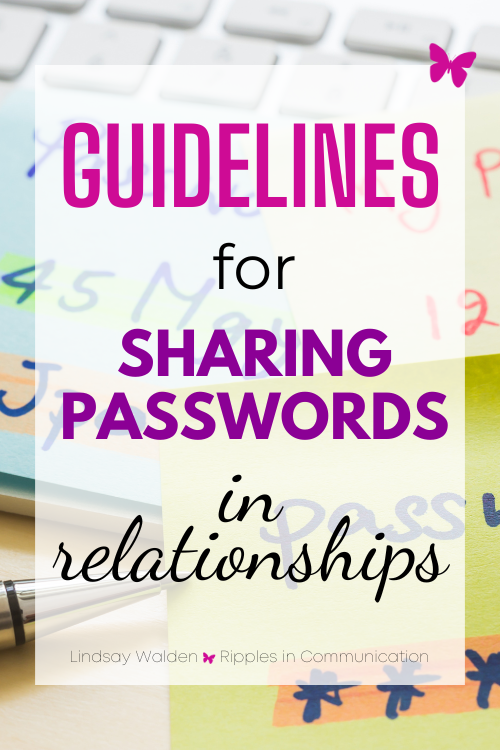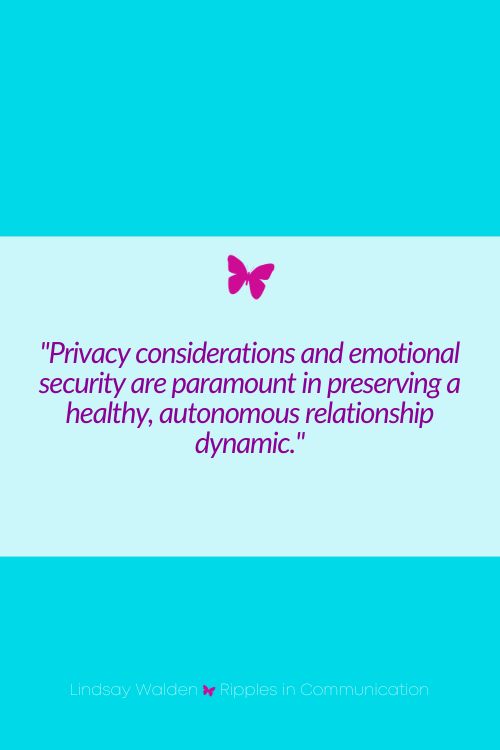Should I Share My Passwords With My Significant Other?
The Debate on Sharing Passwords in Relationships
The question of whether partners ought to exchange all their digital codes launches a multifaceted debate entwining themes of trust, personal space, and closeness within a union. Advocates argue such transparency cements confidence and unity, essential for nurturing a vibrant, intimate connection. Critics, however, see this as an encroachment on intrinsic autonomy, fearing it might sow seeds of doubt or stifle individual expression. Understanding the impetus behind both viewpoints sheds light on more than mere online practices— it delves into the crux of what it means to maintain both a distinct and collective identity in love.
Key Takeaways:
Couples therapy and dialogue can illuminate the nuances between sharing and overexposure.
Constructing trust hinges not on open passwords but on the mutual respect for boundaries.
Privacy considerations and emotional security are paramount in preserving a healthy, autonomous relationship dynamic.
Have you gotten my FREE Relationship Communication Guide yet? Start building an authentic, conscious, and thriving relationship with your partner TODAY. Say goodbye to misunderstandings, conflicts, and missed opportunities for a deeper connection. These are the same tips and practical advice I give to my clients every day. With this guide, you'll be equipped to navigate any communication challenge and build a strong and fulfilling bond with your partner. Click the button below to enter your email address and I will send the guide to your inbox right away!
Understanding Privacy in a Relationship
In every healthy relationship, privacy plays a pivotal role. It upholds individual autonomy and ensures that each partner maintains their sense of self outside the partnership. Our digital footprints, enshrined in emails, social media accounts, and even shopping histories, deserve protection just as much as our physical spaces. Recognizing this need for personal space doesn't signify a lack of trust but acknowledges mutual respect for personal autonomy. Thus, safeguarding our digital boundaries is not about harboring secrets but about preserving the essential individuality that brought us together. In the dance of intimacy, respecting privacy concerns is fundamental, sending a message that, while we share a life, we also honor our distinct journeys.
Trust and Transparency
In the realm of couples therapy, it's acknowledged that trust serves as the framework upon which strong relationships are built. Transparency, vital for cultivating this trust, must be navigated carefully to prevent crossing into the territory of oversharing, which can inadvertently damage the bond. Striking a balance is key; while complete openness can foster emotional security and diminish concerns of infidelity, excessive transparency might erode personal autonomy and lead to issues of boundary setting. Thus, couples must engage in authentic conversations to define what degree of knowledge – including access to online privacy through passwords – is essential for their mutual peace without compromising their sense of individual privacy rights. This dialogue, grounded in understanding each partner's needs and past traumas, is pivotal in fostering a connection that respects both trust and individual boundaries in a healthy relationship.
The Significance of Sharing Passwords
In the realm of couples therapy and fostering connection, the gesture of sharing passwords wades through a complex sea of relationship dynamics, touching on trust in relationships and the negotiation of digital boundaries. It's a statement, voicing a commitment to transparency and emotional security, yet it whispers fears of privacy concerns and individual autonomy. Sharing passwords might illuminate paths to intimacy issues resolved and authenticity in communication, enabling partners to traverse past traumas in relationships together. Conversely, it may cast shadows of control, seeding doubts in the soil of personal space left untended. This delicate balance underpins the foundation of healthy relationships, urging both partners to tread mindfully between the pillars of trust and personal privacy rights, navigating disagreements with wisdom.
Discover essential tips for managing password sharing in your relationship, ensuring both trust and privacy are maintained.
Pros of Sharing Passwords
Heightened trust: Sharing passwords can serve as a powerful symbol of trust between partners, demonstrating a commitment to transparency and emotional security.
Improved communication: This act often prompts essential discussions on boundaries, privacy concerns, and individual autonomy, fostering deeper understanding and authentic conversations.
Convenience in practical situations: In moments that necessitate quick access to shared information or accounts, having this openness simplifies processes, aiding in the smooth operation of daily tasks and emergency scenarios.
Combatting relationship PTSD: For couples navigating past traumas in relationships, mutual password sharing might help reassure each other, contributing to a more stable and secure connection.
Cons of Sharing Passwords
Sharing passwords between partners, while seemingly a gesture of trust, can present significant downsides. Privacy concerns loom large, with the potential for personal autonomy to be compromised. Individuals risk losing a part of their identity, crucial for emotional security in any relationship. Furthermore, the dynamics within a partnership could shift unfavorably, fostering jealousy instead of intimacy. Risk of misuse cannot be overlooked; once shared, passwords can be exploited, damaging trust irreparably. This act might lead to boundary setting challenges, as both parties struggle with navigating disagreements over online privacy. Coping with these issues requires understanding each other's needs, emphasizing the importance of healthy relationships grounded in mutual respect for individual privacy rights.
Navigating the Conflict
In the realm of couples therapy, I've witnessed how password sharing can become a contentious issue. It's a delicate balancing act between fostering trust and respecting individual privacy rights. Communication in relationships is key. Begin the conversation by expressing your emotions without accusation or assumption. Clearly articulate why you feel the way you do about the exchange of digital boundaries. Acknowledge that while sharing passwords might enhance emotional security for one, it could evoke feelings of overexposure for the other.
A compromise might entail sharing access to specific accounts deemed necessary for shared responsibilities, thereby navigating the thin line of online privacy and trust in relationships. This approach honors both the need for transparency and the importance of maintaining personal autonomy. Remember, healthy relationships are built on mutual understanding and respect for each other's boundaries.
Beyond Passwords: The Real Issues
The conversation around sharing passwords often veils deeper concerns within a partnership. These concerns might manifest as a lack of trust, unresolved past traumas, or a desire to exert control, revealing a complex web of emotional security and relationship dynamics that demand attention. A surface disagreement over digital boundaries can indeed reflect deeper intimacy issues or communication in relationships hurdles that couples face.
In my practice as a couples therapist, I've seen how navigating disagreements about online privacy can uncover significant insights into how partners perceive trust, boundary setting, and personal autonomy. Addressing these underlying issues is crucial for fostering connection and developing a healthy relationship. Through authentic conversations, couples can begin to understand each other's needs, coping with jealousy, and ensuring each partner respects individual privacy rights while building a foundation of emotional security.
Explore the importance of privacy and emotional security in maintaining a healthy relationship dynamic.
Building a Foundation of Trust
In the journey towards fostering a healthy relationship, creating a foundation of trust stands paramount. It transcends the mere exchange of passwords. Trust, after all, is built upon deeper elements such as emotional security, authentic conversations, and understanding your partner's needs. One step towards this goal involves engaging in open, honest dialogues about boundary setting, privacy concerns, and individual privacy rights. These discussions can illuminate each person's stance on online privacy and digital boundaries, thereby preventing misunderstandings.
Moreover, acknowledging past traumas in relationships and their impact on present dynamics is crucial. By doing so, we disarm the power of unresolved issues and pave the way for emotional healing. This approach reaffirms the significance of personal autonomy within a union. Couples therapy offers a safe platform for navigating disagreements and coping with jealousy, leading to healthier relationship dynamics. In essence, the pursuit of understanding and respecting each other's need for privacy fosters a closer connection without compromising individual autonomy.
When Sharing Makes Sense
In certain situations, sharing passwords within a relationship can enhance mutual trust and emotional security. Instances where digital boundaries become blurred, yet respecting individual privacy rights, marks a testament to a healthy relationship dynamic. It's not merely about online privacy but fostering deeper connection and understanding each other's needs. For example, managing joint financial accounts or emergency situations necessitates access to specific online information, making sharing passwords a matter of practicality and safety.
Approaching this sensitive topic requires a foundation of strong communication in relationships. Start by expressing your needs and concerns openly, avoiding any hints of accusation. Listening is just as crucial; grasp fully why your partner might feel hesitant. Compromise becomes your strongest tool, perhaps agreeing to share passwords only for essential accounts. This method respects personal autonomy while ensuring both parties feel secure and trusted. It's about navigating disagreements with empathy, paving the way for a relationship built on trust, not surveillance.
Preserving Individuality and Privacy
In the journey of fostering connection and nurturing healthy relationships, the preservation of personal autonomy stands paramount. Navigating disagreements and coping with jealousy often lead to dialogue about online privacy and digital boundaries. Upholding individual privacy rights is not just about safeguarding passwords but about respecting each other's space and autonomy. Trust in relationships burgeons when both partners agree on boundary setting. This framework allows emotional security to flourish without the need for constant oversight or the relinquishing of one's digital autonomy. Such practices not only prevent the erosion of trust but also reinforce the foundation of authentic conversations and understanding partner's needs, critical for a thriving partnership.
Unlocking Deeper Connection
Diving into the depths of our desires for password sharing often uncovers layers beneath. It invites us to confront not merely a preference for transparency but probes the essence of our emotional security and the trust dynamics within our relationships. Exploring these realms, we recognize that the debate over digital boundaries and online privacy extends far beyond simple access to accounts; it reflects our deeper needs for connection and the assurance that our relationships stand on a foundation of mutual respect and understanding.
This journey towards deeper intimacy compels us to ask ourselves and our partners about the real fears and hopes that drive our stance on sharing passwords. Handling such sensitive discussions with care could pave the way for authentic conversations, fostering a stronger bond. It encourages us to navigate past traumas in relationships with compassion, aiming for a future where trust isn't quantified by shared secrets but built through continuous, open dialogue and respect for individual privacy rights. Let us, together, unlock the gates to a connection that thrives on emotional security, guided by the conviction that our bonds are defined not by what we share but how we support each other's growth and autonomy.
Reflections for a Healthier Relationship
In our journey through the complexities of sharing passwords within relationships, we've unpacked layers that touch upon privacy concerns, trust, and the essence of intimacy. Delving into these themes required us to examine personal autonomy, boundary setting, and what fostering connection truly means in the digital era. The conversation underscored the importance of navigating disagreements with emotional security in mind, advocating for open, authentic conversations that respect individual privacy rights while striving for a healthy relationship dynamic.
The prospect of sharing or withholding passwords can mirror deeper undercurrents of past traumas, highlighting the need for understanding a partner's needs and coping with jealousy in constructive ways. My encouragement for you involves reflecting deeply on the foundation of trust in your relationships. It's crucial to engage in discussions that prioritize mutual respect and seek to understand the nuanced perspectives on digital boundaries. Remember, the strongest connections are built on a bedrock of clear communication, shared values, and an unwavering commitment to each other's growth and happiness.
Strengthen your relationship with these empowering daily affirmations that promote trust, respect for privacy, and open communication about digital boundaries. Perfect for couples looking to enhance their connection and understand each other's needs in the digital age.








